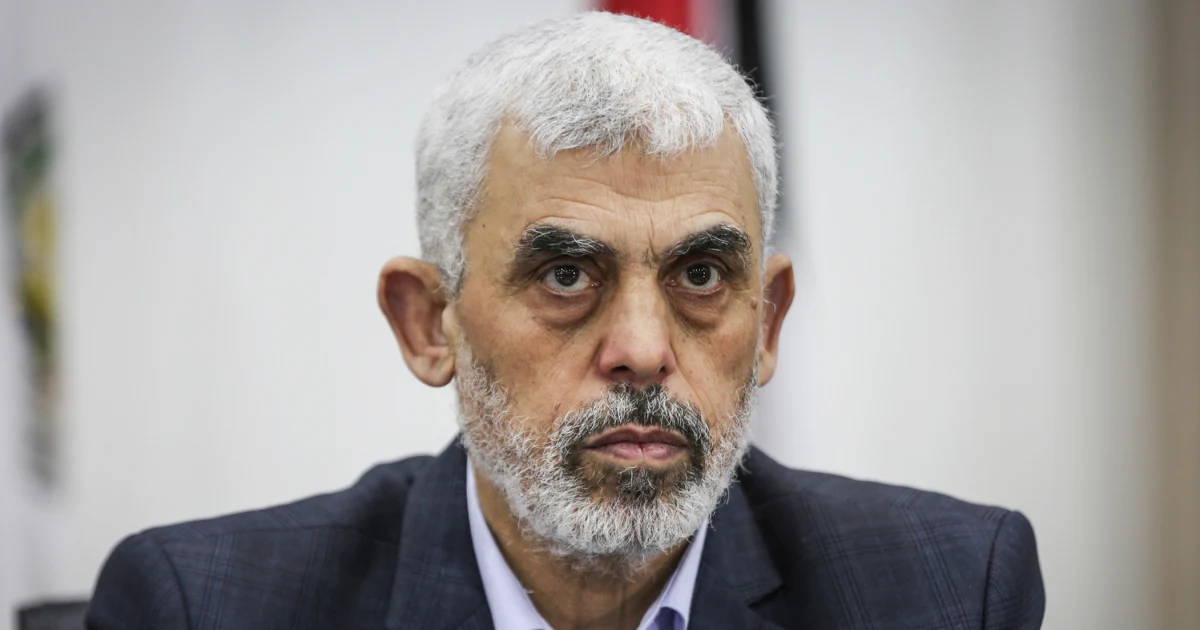
Yahya Sinwar, the current leader of Hamas in Gaza, has once again captured global attention. As a key figure in one of the most protracted and complex conflicts of the modern era, Sinwar’s actions and rhetoric are closely watched by governments, media, and citizens around the world. This blog explores why Yahya Sinwar is trending, examining his background, rise to power, recent actions, and the broader implications of his leadership on the Israel-Palestine conflict and beyond.
Yahya Sinwar’s Background and Rise to Power
Early Life and Radicalization
Yahya Sinwar was born in 1962 in the Khan Yunis refugee camp in the Gaza Strip, a territory that has been at the heart of the Israeli-Palestinian conflict since 1948. His early life was marked by the harsh realities of occupation, displacement, and poverty, experiences that would shape his political and ideological views.
Sinwar’s radicalization began at a young age. He joined the Muslim Brotherhood in his teens, the organization that later became the backbone of Hamas. His involvement in militant activities led to his arrest by Israeli authorities in 1982. Sentenced to life imprisonment in 1988 for his role in the killing of Palestinians suspected of collaborating with Israel, Sinwar became one of the most prominent prisoners in Israeli jails.
During his 22 years in prison, Sinwar deepened his ideological commitment to the Palestinian cause. He was heavily influenced by the writings of Hassan al-Banna and Sayyid Qutb, key figures in the Islamist movement. His time in prison also solidified his position within Hamas, where he was regarded as a symbol of resistance against Israel.
Role in Hamas
Yahya Sinwar’s release in 2011, as part of the Gilad Shalit prisoner exchange between Hamas and Israel, marked a significant turning point in his life and the future of Hamas. Sinwar quickly ascended the ranks of the organization, leveraging his status as a “hero” of the resistance and his deep ties within the movement. His leadership within Hamas was characterized by a mix of militancy and pragmatism, balancing the need for armed resistance with the realities of governing Gaza.
In 2017, Sinwar was elected as the leader of Hamas in Gaza, succeeding Ismail Haniyeh. His election was seen as a shift towards a more hardline stance within the movement, reflecting the influence of the Qassam Brigades, Hamas’s military wing, which Sinwar had long been associated with. Under his leadership, Hamas has maintained its commitment to armed resistance against Israel, while also navigating the complex dynamics of Palestinian politics and international diplomacy.
Leadership Style and Philosophy
Sinwar’s leadership style is a blend of ideological fervor and calculated strategy. He is known for his strong oratory skills, his ability to inspire both fear and loyalty, and his unwavering commitment to the Palestinian cause. Unlike some of his predecessors, Sinwar has shown a willingness to engage in indirect negotiations with Israel, particularly through Egyptian mediation. However, he remains firmly opposed to any peace process that does not fully address Palestinian demands, including the right of return for refugees and the establishment of an independent Palestinian state with Jerusalem as its capital.
Sinwar’s philosophy is rooted in the belief that the only way to achieve Palestinian liberation is through resistance. He has consistently rejected the Oslo Accords and other peace initiatives, viewing them as capitulations to Israeli and Western interests. Under his leadership, Hamas has continued to build its military capabilities, including the development of rockets and tunnels, while also attempting to gain international legitimacy as a political actor.
Recent Actions/Statements that Sparked Attention
Specific Incident or Statement
Yahya Sinwar’s recent actions have once again placed him at the center of global attention. In 2024, during a period of heightened tensions between Israel and Gaza, Sinwar made a series of inflammatory statements that were widely covered by international media. He threatened to escalate violence if Israel did not lift the blockade on Gaza and accused Israel of committing war crimes against Palestinians. These statements were made during a rally in Gaza, where Sinwar was seen brandishing a rifle, symbolizing Hamas’s readiness for armed confrontation.
Sinwar’s rhetoric was accompanied by actions on the ground. Hamas launched a series of rocket attacks into southern Israel, leading to retaliatory airstrikes by the Israeli Defense Forces (IDF). The escalation resulted in significant casualties on both sides and brought the region to the brink of a larger conflict. Sinwar’s defiant stance and his refusal to back down in the face of Israeli military power resonated with many Palestinians, who view him as a steadfast defender of their rights.
Reactions
The international response to Sinwar’s actions and statements was swift and varied. Israel condemned Sinwar as a terrorist leader responsible for the deaths of innocent civilians, both Israeli and Palestinian. Israeli Prime Minister Benjamin Netanyahu vowed to hold Hamas accountable and intensified military operations in Gaza.
The United States and the European Union, while reaffirming Israel’s right to defend itself, called for restraint and urged both sides to avoid further escalation. However, they also criticized Hamas for its indiscriminate rocket attacks and its refusal to engage in peace talks.
In contrast, Sinwar received support from several regional actors. Iran, a key backer of Hamas, praised Sinwar’s leadership and condemned Israel’s actions as aggression against the Palestinian people. Hezbollah, the Lebanese militant group, also expressed solidarity with Hamas, raising concerns about a potential wider conflict in the region.
Media Coverage
Media coverage of Yahya Sinwar’s recent actions varied widely depending on the source. Israeli and Western media outlets largely portrayed Sinwar as a dangerous extremist, focusing on his role in perpetuating violence and his rejection of peace efforts. They highlighted the suffering of Israeli civilians under rocket fire and the challenges faced by the IDF in dealing with Hamas’s tactics.
On the other hand, media outlets in the Arab world and other parts of the Global South provided a different perspective. They emphasized Sinwar’s resistance against Israeli occupation and his role in defending Palestinian rights. Some outlets portrayed him as a hero of the Palestinian cause, standing up to Israeli aggression in the face of overwhelming odds.
This divergent media coverage reflects the deep-seated divisions in how the Israel-Palestine conflict is viewed globally. It also underscores the challenges in achieving a balanced and nuanced understanding of the situation, where both Israeli and Palestinian narratives are given equal weight.
Impact on the Israel-Palestine Conflict
Escalation of Tensions
Yahya Sinwar’s actions have had a direct impact on the escalation of tensions between Israel and Gaza. His refusal to compromise and his emphasis on armed resistance have contributed to the cyclical nature of the conflict, where periods of relative calm are followed by sudden and intense outbreaks of violence.
Sinwar’s leadership has also influenced the broader dynamics of the conflict. His hardline stance has made it difficult for other Palestinian factions, including Fatah, to engage in meaningful dialogue with Israel. The division between Hamas and the Palestinian Authority, which controls the West Bank, has further complicated efforts to present a united Palestinian front in negotiations.
The recent escalation under Sinwar’s leadership has raised fears of a larger, more protracted conflict. The potential for a full-scale war between Israel and Hamas looms large, with devastating consequences for civilians on both sides. The humanitarian situation in Gaza, already dire due to the blockade and repeated military campaigns, could deteriorate even further, leading to widespread suffering and displacement.
Diplomatic Ramifications
Sinwar’s actions have significant diplomatic ramifications, both for the Israel-Palestine conflict and for the broader Middle East. His refusal to engage in peace talks and his reliance on military tactics have alienated many international actors who might otherwise support the Palestinian cause. This has made it difficult for Hamas to gain broader international legitimacy and has limited its ability to influence the global diplomatic agenda on Palestine.
At the same time, Sinwar’s leadership has strengthened ties between Hamas and regional powers such as Iran and Turkey. These countries have provided financial, military, and political support to Hamas, viewing it as a key player in the broader struggle against Israel and Western influence in the region. This alignment has contributed to the polarization of the Middle East, with different countries supporting opposing sides in the Israel-Palestine conflict.
Sinwar’s actions have also impacted Israel’s diplomatic relations with other countries. The recent escalation has strained Israel’s ties with the United States and European countries, which have been critical of the humanitarian impact of Israeli military operations in Gaza. However, Israel has also received strong support from some Arab countries, particularly those that have normalized relations with Israel under the Abraham Accords.
Public Sentiment
Yahya Sinwar’s leadership has had a profound impact on public sentiment, both in Gaza and Israel. In Gaza, Sinwar is seen by many as a symbol of resistance against Israeli occupation. His refusal to compromise and his willingness to confront Israel militarily have earned him the admiration of many Palestinians who feel that peaceful negotiations have failed to deliver tangible results.
However, Sinwar’s actions have also led to significant suffering for the people of Gaza. The repeated cycles of violence have devastated the territory’s infrastructure, economy, and social fabric. Many Gazans are frustrated with the ongoing conflict and the lack of prospects for a peaceful resolution. This has led to internal divisions within Gaza, with some criticizing Hamas’s tactics and calling for a different approach to the conflict.
In Israel, public sentiment towards Sinwar and Hamas is overwhelmingly negative. The rocket attacks on Israeli civilians have fueled anger and fear, leading to strong support for military actions against Hamas. The ongoing conflict has also deepened divisions within Israeli society, with debates over the government’s handling of the situation and the broader question of how to achieve long-term security for Israel.
Sinwar’s Position within Hamas and Future Prospects
Internal Politics of Hamas
Yahya Sinwar’s position within Hamas is both powerful and precarious. As the leader of Hamas in Gaza, he wields significant influence over the organization’s military and political strategy. His hardline stance has the support of the Qassam Brigades and other militant factions within Hamas, who view him as a strong leader capable of standing up to Israel.
However, Sinwar’s leadership is not without its challenges. Within Hamas, there are differing views on how to achieve the organization’s goals. Some members, particularly those based outside Gaza, have advocated for a more pragmatic approach, including negotiations with Israel and a focus on political rather than military strategies. Sinwar’s refusal to compromise has led to tensions within the movement, with some questioning whether his approach is sustainable in the long term.
Sinwar also faces challenges from other Palestinian factions. The rivalry between Hamas and Fatah, the dominant political force in the West Bank, remains a significant obstacle to Palestinian unity. Efforts to reconcile the two factions have repeatedly failed, with Sinwar’s hardline stance contributing to the divisions. This has weakened the overall Palestinian position in negotiations with Israel and the international community.
Potential Future Moves
Looking ahead, Yahya Sinwar’s future moves will be closely watched by both his supporters and his opponents. Within Hamas, Sinwar is likely to continue to push for a militant approach to the conflict with Israel, emphasizing the need for armed resistance as the primary means of achieving Palestinian liberation. He may also seek to strengthen Hamas’s ties with regional powers such as Iran, which can provide the resources and support needed to sustain the organization’s activities.
At the same time, Sinwar may also explore opportunities for indirect negotiations with Israel, particularly through mediators such as Egypt and Qatar. While he is unlikely to engage in direct peace talks, Sinwar may be open to temporary truces or ceasefires that can provide some relief to the people of Gaza and allow Hamas to regroup and rebuild its capabilities.
Sinwar’s future will also be influenced by the broader geopolitical dynamics in the Middle East. Changes in the regional balance of power, shifts in alliances, and the outcomes of conflicts in Syria, Lebanon, and elsewhere could all impact Sinwar’s strategy and his position within Hamas. How Sinwar navigates these challenges will determine his legacy and the future of the Israel-Palestine conflict.
Global Implications
Broader Middle East Dynamics
Yahya Sinwar’s leadership has implications that extend beyond the Israel-Palestine conflict and into the broader dynamics of the Middle East. His actions are closely watched by other militant groups in the region, including Hezbollah in Lebanon, the Houthis in Yemen, and various Islamist factions in Syria and Iraq. Sinwar’s ability to sustain resistance against Israel, despite the immense military and economic pressures on Gaza, serves as an inspiration to these groups and influences their strategies.
Sinwar’s alignment with Iran also has broader implications for the Middle East. Iran’s support for Hamas is part of its broader strategy to challenge Israeli and Western influence in the region. This alignment has contributed to the polarization of the Middle East, with countries such as Saudi Arabia and the United Arab Emirates viewing Hamas as an Iranian proxy and a destabilizing force in the region. This has further complicated efforts to achieve a peaceful resolution to the Israel-Palestine conflict and has contributed to the broader instability in the Middle East.
International Relations
Yahya Sinwar’s actions have also had an impact on international relations, particularly in the context of the Israel-Palestine conflict. His refusal to engage in peace talks and his reliance on militant tactics have made it difficult for the international community to support Hamas. This has limited Hamas’s ability to influence the global diplomatic agenda on Palestine and has contributed to the isolation of Gaza from the broader international community.
At the same time, Sinwar’s actions have also impacted Israel’s relations with other countries. The recent escalation in violence has strained Israel’s ties with the United States and European countries, which have been critical of the humanitarian impact of Israeli military operations in Gaza. However, Israel has also received strong support from some Arab countries, particularly those that have normalized relations with Israel under the Abraham Accords.
The ongoing conflict and Sinwar’s leadership also have implications for global security. The potential for the conflict to escalate into a broader regional war, involving multiple countries and militant groups, poses a significant threat to international stability. The continued violence in Gaza also fuels anti-Western sentiment and contributes to the radicalization of individuals and groups around the world, increasing the risk of terrorism and other forms of violence.
Terrorism and Security Concerns
Yahya Sinwar’s leadership raises significant concerns about terrorism and security, both in the Middle East and beyond. His commitment to armed resistance and his willingness to use violence as a tool of political leverage make him a key figure in the global jihadist movement. Sinwar’s ability to inspire and mobilize militants, both within Gaza and across the region, poses a significant challenge to counterterrorism efforts.
The ongoing conflict between Israel and Hamas also has broader implications for global security. The violence in Gaza has the potential to spill over into neighboring countries, destabilizing the region and increasing the risk of conflict. The continued suffering of civilians in Gaza also fuels anger and resentment, which can be exploited by extremist groups to recruit new members and carry out attacks.
In addition to the immediate security concerns, Sinwar’s leadership also raises questions about the long-term prospects for peace and stability in the Middle East. As long as Hamas continues to rely on militant tactics and refuses to engage in meaningful negotiations, the prospects for a peaceful resolution to the Israel-Palestine conflict remain slim. This ongoing instability has far-reaching implications for global security, as it contributes to the broader cycle of violence and radicalization that affects countries around the world.
Conclusion
Yahya Sinwar is a complex and controversial figure whose leadership has had a profound impact on the Israel-Palestine conflict and the broader dynamics of the Middle East. His commitment to armed resistance and his refusal to compromise have made him a symbol of Palestinian defiance, but they have also contributed to the ongoing violence and suffering in Gaza. As Sinwar continues to navigate the challenges of leadership within Hamas and the broader geopolitical landscape, his actions will continue to shape the future of the region and influence the global debate on peace, security, and justice in the Middle East.
Call to Action/Reflection
As Yahya Sinwar continues to dominate headlines, it is essential for observers, analysts, and policymakers to remain informed about the evolving situation in Gaza and the broader Israel-Palestine conflict. The complexities of this conflict require careful consideration of all perspectives and a commitment to finding a just and lasting solution that addresses the needs and rights of all parties involved.
What do you think about Yahya Sinwar’s approach to leadership? Can a hardline stance ever lead to peace, or does it only perpetuate the cycle of violence? How can the international community play a more constructive role in resolving the Israel-Palestine conflict? Share your thoughts in the comments below and join the conversation.







